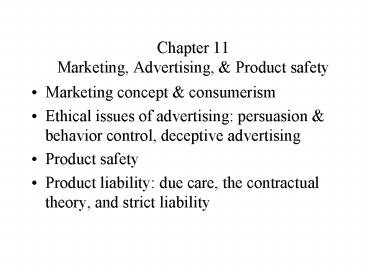Chapter 11 Marketing, Advertising,
1 / 18
Title: Chapter 11 Marketing, Advertising,
1
Chapter 11Marketing, Advertising, Product
safety
- Marketing concept consumerism
- Ethical issues of advertising persuasion
behavior control, deceptive advertising - Product safety
- Product liability due care, the contractual
theory, and strict liability
2
Marketing
- The performance of business activities that
direct the flow of goods and services from
producer to consumer or user - Ethical issues occur in product development,
distribution, pricing, promotion, and sales
3
Producers Rights
- 1. To make decisions regarding the products
offered for sale (e.g. design and style) - 2. To set the price for products and all other
terms of sale, including warranties - 3. To determine how products will be made
available to consumers - 4. To promote products in any way that producers
choose.
4
Buyers Rights
- Be protected from harmful products
- Be provided with adequate information about
products - Be offered a choice among products that they
truly want - Have a choice in the making of marketing decisions
5
Packaging Labeling
- Consumers need information to make rational
choices - Identity of product, the name and location of the
manufacturer, packer or distributor, the net
quantity, the number of servings, applications,
relevant nutrition information and limits the use
of health claims, such as low fat, light, healthy
6
Pricing
- The true price of products?
- The proliferation of products at different
prices, price codes that can be read only by
sales personnel, the omission of essential
extras, hidden costs, all prevent consumers
from calculating the true price
7
The Obligation to Provide Information
- Manufacturers have an obligation to provide
information that consumers cannot reasonably
obtain themselves
8
Deceptive Manipulative Marketing practices
- Deceptive involves creating or taking advantage
of false beliefs that significantly interfere
with the ability of consumers to make rational
choices. - Include suggested retail price, cents off
and introductory offers, bogus clearance sales,
deceptive packaging and labeling, complicated
warranties
9
Manipulation
- Non-coercive shaping of the alternative available
to consumers or their perceptions of those
alternatives which effectively result in
consumers being deprived of a choice - Include customary pricing, bait and switch,
high-pressure sales techniques
10
Marketing Research
- Participants are deceived about the purpose of a
study, when the research is done to make a
sales pitch (sugging), or when retailers, through
the use of database marketing, are able to
construct
11
Anticompetitive Marketing Practices
- Price fixing, price discrimination, resale price
maintenance, reciprocal dealing, tying
arrangements, and exclusive dealing - Lead to the formation of monopolies, drives
competitors out of business and increases prices
to consumers - Distort market mechanism for setting prices
12
Advertismg
- A paid form of nonpersonal communication about an
organization and/or its product that is
transmitted to a target audience through a mass
medium - Other types PR, Sales promotion, and personal
selling - Product, corporate, and advocacy advertising
13
Advertising
- Criticized for exaggerated claims, irritating
repetition, objectionable products, creation of a
culture of consumerism - A wasteful and inefficient activity that stifles
competition and leads to monopoly conditions - Appeals to emotions
- Behavior control through the exploitation of
psychological research into human motivation
14
Persuasion and Behavior Control
- Subliminal communication product placement
- Rational Nonrational persuasion
15
Deceptive Advertising
- An ad is deceptive if it causes a significant
percentage of potential consumers to have false
beliefs about the product (Carson) - Deception occurs when a false belief, which an
ad either creates or take advantage of,
substantially interferes with peoples ability to
make rational consumer choices - Substantial interferes (1) the ability of
consumers to protect themselves and make rational
choices and (2) the seriousness of the choice
that consumers are making.
16
Theories of Product Liability
- The Due Care Theory manufacturers are obligated
to take all reasonable precautions to ensure
their products are free of defects likely to
cause harm. - Negligence the probability of harm, the severity
of the harm, and the burden of protecting against
the harm.
17
Contractual Theory
- The obligations of a manufacturer to a consumer
are contained in an implicit or explicit sales
contract - Implicit implied warranty of merchantability and
an implied warranty of fitness - Express warranty any affirmation of fact or
promise made by the seller to the buyer - Principle fairness
18
Strict Liability
- Manufacturers are responsible for all harm
resulting from a dangerously defective product,
even when due care has been exercised and all
contracts observed. - Privity does not require that a victim of an
accident be in a direct contractual relation with
the manufacturer































